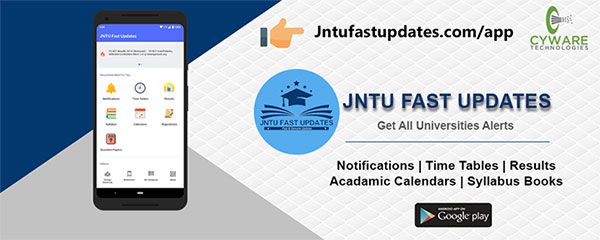JNTUK R20 3-1 Computer Networks Material/Notes PDF Download
Students those who are studying JNTUK R20 CSE Branch, Can Download Unit wise R20 3-1 Computer Networks Material/Notes PDFs below.

JNTUK R20 3-1 Computer Networks Material/Notes PDF Download
Course Objectives: The main objectives are
- To provide insight about networks, topologies, and the key concepts.
- To gain comprehensive knowledge about the layered communication architectures (OSI and TCP/IP) and its functionalities.
- To understand the principles, key protocols, design issues, and significance of each layers in ISO and TCP/IP.
- To know the basic concepts of network services and various network applications.
Course Outcomes: At the end of the course, the students will be able to:
- Demonstrate different network models for networking links OSI, TCP/IP, B-ISDN, N-BISDN and get knowledge about various communication techniques, methods and protocol standards.
- Discuss different transmission media and different switching networks.
- Analyze data link layer services, functions and protocols like HDLC and PPP.
- Compare and Classify medium access control protocols like ALOHA, CSMA, CSMA/CD, CSMA/CA, Polling, Token passing, FDMA, TDMA, CDMA protocols
- Determine application layer services and client server protocols working with the client server paradigms like WWW, HTTP, FTP, e-mail and SNMP etc.
UNIT-1
Introduction: Network Types, LAN, MAN, WAN, Network Topologies Reference models- The OSI Reference Model- the TCP/IP Reference Model – A Comparison of the OSI and TCP/IP Reference Models, OSI Vs TCP/IP, Lack of OSI models success, Internet History.
Physical Layer –Introduction to Guided Media- Twisted-pair cable, Coaxial cable and Fiber optic cable and unguided media: Wireless-Radio waves, microwaves, infrared.
Download UNIT-1 Material PDF | Reference-2
UNIT-2
Data link layer: Design issues, Framing: fixed size framing, variable size framing, flow control, error control, error detection and correction codes, CRC, Checksum: idea, one’s complement internet checksum, services provided to Network Layer, Elementary Data Link Layer protocols: simplex protocol, Simplex stop and wait, Simplex protocol for Noisy Channel.
Sliding window protocol: One bit, Go back N, Selective repeat-Stop and wait protocol, Data link layer in HDLC: configuration and transfer modes, frames, control field, point to point protocol (PPP): framing transition phase, multiplexing, multi link PPP.
UNIT-3
Media Access Control: Random Access: ALOHA, Carrier sense multiple access (CSMA), CSMA with Collision Detection, CSMA with Collision Avoidance, Controlled Access: Reservation, Polling, Token Passing, Channelization: frequency division multiple Access(FDMA), time division multiple access(TDMA), code division multiple access(CDMA).
Wired LANs: Ethernet, Ethernet Protocol, Standard Ethernet, Fast Ethernet(100 Mbps), Gigabit Ethernet, 10 Gigabit Ethernet.
Download UNIT-3 Material PDF
UNIT-4
The Network Layer Design Issues – Store and Forward Packet Switching-Services Provided to the Transport layer- Implementation of Connectionless Service-Implementation of Connection Oriented Service- Comparison of Virtual Circuit and Datagram Networks, Routing Algorithms-The Optimality principle-Shortest path, Flooding, Distance vector, Link state, Hierarchical, Congestion Control algorithms-General principles of congestion control, Congestion prevention polices, Approaches to Congestion Control-Traffic Aware Routing- Admission Control-Traffic Throttling-Load Shedding. Traffic Control Algorithm-Leaky bucket & Token bucket.
Internet Working: How networks differ- How networks can be connected- Tunnelling, internetwork routing-, Fragmentation, network layer in the internet – IP protocols-IP Version 4 protocol-IPV4 Header Format, IP addresses, Class full Addressing, CIDR, NAT-, Subnets-IP Version 6-The main IPV6 header, Transition from IPV4 to IPV6, Comparison of IPV4 & IPV6- Internet control protocols- ICMP-ARPDHCP
UNIT-5
The Transport Layer: Transport layer protocols: Introduction-services- port number-User data gram protocol-User datagram-UDP services-UDP applications-Transmission control protocol: TCP servicesTCP features- Segment- A TCP connection- windows in TCP- flow control-Error control, Congestion control in TCP.
Application Layer –- World Wide Web: HTTP, Electronic mail-Architecture- web based mail- email security- TELENET-local versus remote Logging-Domain Name System: Name Space, DNS in Internet ,- Resolution-Caching- Resource Records- DNS messages- Registrars-security of DNS Name Servers, SNMP.
TEXT BOOKS:
1. Computer Networks — Andrew S Tanenbaum, Fifth Edition. Pearson Education/PHI
2. Data Communications and Networks – Behrouz A. Forouzan, Fifth Edition TMH.
REFERENCE BOOKS:
1. Data Communications and Networks- Achut S Godbole, Atul Kahate
2. Computer Networks, Mayank Dave, CENGAGE
e-Resources:

320-x100(1).gif)

unit 3 is not downloading
Unit 3 material is not available. Can not be downloaded
3rd unit link is not working
unit 3 was unable to download in computer networks
Unit 3 was unavailable to download in cn